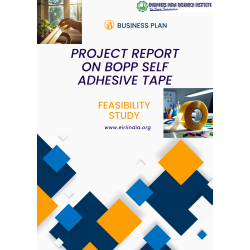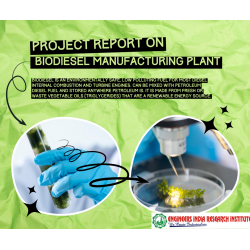Chitin & Chitosan from Prawn Shell Waste (Cap: 4500 Kg/Day)

- More than 45 years of experience
- Managed by expert industrial consultants
- ISO 9001-2015 Certified
- Registered under MSME, UAM No: DL01E0012000
- 24/5 Research Support
Get your quesries resolved from an industry expert. Ask your queries before report or book purchase. - Custom Research Service
Speak to the our consultant to design an exclusive study to serve your research needs. - Quality Assurance
All reports are prepared by highly qualified consultants & verified by a panel of experts. - Information Security
Your personal & confidential information is safe & secure.
CHITIN & CHITOSAN FROM PRAWN SHELL WASTE (CAP: 4500 KG/DAY)
[EIRI/EDPR/4775] J.C.: 2995XL
Chitin is a white, hard, inelastic, nitrogenous, polysaccharide found in the outer skeleton of insects, crabs, shrimps and lobsters and in the internal structures of invertebrates. It is the second most abundant organic compound next to cellulose. It is a macro molecular linear polymer of_ (1-4) N acetyl D glucosamine and is insoluble in water and many organic solvents. Chitin itself has only a few applications; it acts more as a precursor of Chitosan, its most familiar derivative.
Chitosan is deacetylated chitin, and is polymer of _(1-4) acetyl - D glucosamine. It has multifarious uses in the cosmetic, pharmaceutical and medical industries. It is even considered as a wonder drug of the twenty-first century due to its versatile utility.
Chitin is a chemical compound belong to glucosamine polysaccharide group categories. It contains about 7% nitrogen, and is structurally similar to cellulose.
It is the principal constituent of the shells of prawn fish, shrimps, crabs, lobsters, beetles and other sea fishes. It is also found in some fungi, algal, and yeasts.
Tidal estuarine waters in the mouths of large and perennial rivers, large brackish water lakes, backwaters, lagoons and swamps scattered along the entire coast-line, afford lucrative estuarine fisheries. Vast stretches of fresh water consisting of rivers, streams, lakes, reservoirs, tanks, ponds and paddy fields offer scope for inland fisheries. The principal rivers of India, including their main tributaries, have a total length of c. 27,360 km. and the length of canals and irrigation channels is c. 1,12,650 km. When added to other freshwater resources, the total surface would run to several million acres of which not more than a million acres are under fish culture. Most of these freshwater resources, though culturable, are at present lying fallow.
COST ESTIMATION
Plant Capacity 4500 Kg./Day
Land & Building (20,000 sq.mt.) Rs. 10.20 Cr
Plant & Machinery Rs. 7.85 Cr
Working Capital for 2 Months Rs. 15.38 Cr
Total Capital Investment Rs. 34.09 Cr
Rate of Return 78%
Break Even Point 27%
CONTENTS
INTRODUCTION
PROPERTIES & CHARACTERISTICS
CHITIN [1398-61-4]:
ITS EMPIRICAL FORMULA = (C8H13NO5)N
EMPERICAL FORMULA = (C6H11NO4)N
DEGREE OF DEACE ĘLATION
AVERAGE MOLECULAR WEIGHT
VISCOSITIES AND BEHAVIOR IN SOLUTION
SOLUBILITY
CATIONIC PROPERTIES
CHEMISTRY OF CHITIN AND CHITOSAN
USES AND APPLICATIONS
INDUSTRIAL USES:
APPLICATION OF CHITOSAN
CHITOSAN
MEDICAL AND PHARMACEUTICAL USES
BIOMEDICAL USES
PRELIMINARY RESEARCH AND FDA REVIEW
AGRICULTURAL & NUTRITIONAL USES:-
CHITIN SYNTHESIS INHIBITORS
USES OF CHITOSAN
I) CLARIFICATION AND PURIFICATION
II) CHROMATOGRAPHY
III) PAPER AND TEXTILES
IV) PHOTOGRAPHY
V) FOOD AND NUTRITION
VI) AGRICULTURE
II) MEDICAL AND PHARMACEUTICAL
TECHNICAL PARAMETERS
LOCATION OF THE PROJECT
BORROWER’S PROFILE
B.I.S. SPECIFICATION
MARKET OVERVIEW OF CHITIN
CHITIN MARKET DIVIDED BY DERIVATIVE TYPE AS:
CHITIN MARKET DIVIDED BY END-USE AS:
CHITIN MARKET DIVIDED BY GEOGRAPHY AS:
MARKET OVERVIEW OF CHITOSAN
PRESENT MANUFACTURERS OF CHITIN AND CHITOSAN
FOREIGN PRODUCERS OF CHITIN & CHITOSAN
SPECIFICATION AND TEST FOR MEDICAL GRADE CHITOSAN
ANALYZE REPORT OF CHITOSAN (MEDICAL GRADE)
RAW MATERIALS
CHITIN CONTENTS OF SOME ORGANISMS
CRUSTACEA:-
INSECTS:-
MOLLUSKS:-
FUNGI:-
MANUFACTURING PROCESS
BASIC CONCEPT:
CHITIN:
CHITOSAN:
CHITIN:-
DETAILS OF PROCESSING STEPS:-
CHITOSAN MANUFACTURING PROCESS:-
DETAILS OF CHITIN AND CHITOSAN PRODUCTION PROCESS
CHEMICAL ISOLATION OF CHITIN
PROCESS FLOW DIAGRAM
PROCESS FLOWSHEET FOR MANUFACTURING OF CHITIN-FROM PRAWN FISH SHELL WASTES
MANUFACTURING PROCESS OF CHITOSAN (MEDICAL GRADE)
PRETREATMENT STEP
DEMINERALIZATION
DEPROTEINATION
DEACETYLATION
CHITOSAN MANUFACTURING FROM CHITIN (MEDICAL GRADE)
TECHNOLOGY
RAW MATERIAL
DEPROTEINISATION
DEMINERALISATION
REMOVAL OF WATER
DEACETYLATION OF CHITIN
REMOVAL OF WATER
DRYING
POWDERING AND PACKING
YIELD
ILLUSTRATION OF THE PROCESS
PROCESS IN DETAILED
AT THE SAME TIME, ENZYMES
TYPE OF DEACETYLATION: DEACETYLATION PROCESS MAY BE PROVIDED BY TWO SYSTEMS:
TWO EXPLANATIONS OF THIS PHENOMENON HAVE BEEN PROPOSED
TABIE: CHEMICAL COMPOSITION OF VARIOUS CRUSTACEAN WASTES AND OF INSECT'S LARVES OF CALLĘHORA ERYTHROCEPHALA
CHITIN AND CHITOSAN EXTRACTION FROM CHITINOUS MARINE WASTE
CHEMICAL EXTRACTION
CHEMICAL DEPROTEINATION
CHEMICAL DEMINERALIZATION
BIOLOGICAL EXTRACTION
ENZYMATIC DEPROTEINATION
FERMENTATION
LACTIC ACID FERMENTATION
DEPROTEINIZATION OF CHITIN FROM SHRIMP HEAD WASTE
MATERIALS & METHODS
PREPARATION OF RAW MATERIAL
CHITIN EXTRACTION PROCEDURE
CHEMICAL ANALYSIS
FIGURE: THE TWO- STAGE METHOD FOR CHITIN PRODUCTION
TABLE: CHEMICAL COMPOSITION OF SHW1
TABLE: PROTEIN RECOVERY (%) OBTAINED BY USING DIFFERENT DEPROTEINIZATION PROCESSES
TABLE: NITROGENOUS COMPOSITION OF PRECIPITATE AFTER DEPROTEINIZATION PROCESSES
TABLE: EFFECT OF NAOH CONCENTRATION ON THE RESIDUAL PROTEIN CONTENT AND DEGREE OF ACETYLATION OF CHITIN PRODUCED BY THE TWO-STAGE METHOD)
TABLE: SPECIFICATION OF PRODUCED CHITIN COMPARED TO FOOD GRADE PRODUCT
PRODUCTION METHOD OF CHITIN AND CHITOSAN FROM SHRIMP SHELL IN BATCH CULTURE OF LACTOBACILLUS PLANTARUM
MATERIALS AND METHODS
SHRIMP SHELL
DATE SYRUP
TABLE – CHEMICAL CHARACTERISTICS OF DATE SYRUP
FERMENTATION
PREPARATION OF CHITIN
PREPARATION OF CHITOSAN
ANALYTICAL PROCEDURE
EFFLUENT TREATMENT PROCESS
EFFLUENT TREATMENT SYSTEM
PROTEIN PASTE FROM THE SHELL/PROTEIN SEPARATION
NAOH DE-PROTEINIZATION WASH WATER
HCL DE-MINERALIZATION WASH WATER
SEA AND FRESH WASH WATER
PLANT LAYOUT
SUPPLIERS OF PLANT AND MACHINERY
SUPPLIERS OF CONVEYOR BELT
SUPPLIERS OF PULVERISER
SUPPLIERS OF WASHING TANKS
SUPPLIERS OF TRAY DRYER
SUPPLIERS OF PVC TANKS
SUPPLIERS OF LIQUID TANKS
SUPPLIERS OF EVAPORATION UNIT
SUPPLIERS OF DRYING CHAMBER
SUPPLIERS OF BOILERS
SUPPLIERS OF WATER CHILLER
SUPPLIERS OF FILTER PRESS
SUPPLIERS OF LABORATORY TESTING EQUIPMENTS
SUPPLIERS OF CHEMICALS
SUPPLIERS OF RAW MATERIAL
RAW MATERIAL SUPPLIERS FOR CHITIN AND CHITOSAN
SUPPLIERS OF HYDROCHLORIC ACID
SUPPLIERS OF CAUSTIC SODA
SUPPLIERS OF LABORATORY CHEMICALS
ADDRESSES FOR CONSULTANT & TURNKEY PLANT
APPENDIX – A:
01. PLANT ECONOMICS
02. LAND & BUILDING
03. PLANT AND MACHINERY
04. OTHER FIXED ASSESTS
05. FIXED CAPITAL
06. RAW MATERIAL
07. SALARY AND WAGES
08. UTILITIES AND OVERHEADS
09. TOTAL WORKING CAPITAL
10. TOTAL CAPITAL INVESTMENT
11. COST OF PRODUCTION
12. TURN OVER/ANNUM
13. BREAK EVEN POINT
14. RESOURCES FOR FINANCE
15. INSTALMENT PAYABLE IN 5 YEARS
16. DEPRECIATION CHART FOR 5 YEARS
17. PROFIT ANALYSIS FOR 5 YEARS
18. PROJECTED BALANCE SHEET FOR (5 YEARS)
How to Make Project Report?
Detailed Project Report (DPR) includes Present Market Position and Expected Future Demand, Technology, Manufacturing Process, Investment Opportunity, Plant Economics and Project Financials. comprehensive analysis from industry covering detailed reporting and evaluates the position of the industry by providing insights to the SWOT analysis of the industry.
Each report include Plant Capacity, requirement of Land & Building, Plant & Machinery, Flow Sheet Diagram, Raw Materials detail with suppliers list, Total Capital Investment along with detailed calculation on Rate of Return, Break-Even Analysis and Profitability Analysis. The report also provides a birds eye view of the global industry with details on projected market size and then progresses to evaluate the industry in detail.
We can prepare detailed project report on any industry as per your requirement.
We can also modify the project capacity and project cost as per your requirement. If you are planning to start a business, contact us today.
Detailed Project Report (DPR) gives you access to decisive data such as:
- Market growth drivers
- Factors limiting market growth
- Current market trends
- Market structure
- Key highlights
Overview of key market forces propelling and restraining market growth:
- Up-to-date analyses of market trends and technological improvements
- Pin-point analyses of market competition dynamics to offer you a competitive edge major competitors
- An array of graphics, BEP analysis of major industry segments
- Detailed analyses of industry trends
- A well-defined technological growth with an impact-analysis
- A clear understanding of the competitive landscape and key product segments
Need Customized Project Report?
- Ask for FREE project related details with our consultant/industry expert.
- Share your specific research requirements for customized project report.
- Request for due diligence and consumer centric studies.
- Still haven't found what you're looking for? Speak to our Custom Research Team
About Engineers India Research Institute:
Note: We can also prepare project report on any subject based on your requirement and country. If you need, we can modify the project capacity and project cost based on your requirement.
Our Clients

Our Approach
- Our research reports comprehensively cover Indian markets (can be modified as per your country), present investigation, standpoint and gauge for a time of five years*.
- The market conjectures are produced on the premise of optional research and are cross-accepted through associations with the business players
- We use dependable wellsprings of data and databases. What's more, data from such sources is handled by us and incorporated into the report
Why buy EIRI reports?
- Our project reports include detailed analysis that help to get industry Present Market Position and Expected Future Demand.
- Offer real analysis driving variables for the business and most recent business sector patterns in the business
- This report comprehends the present status of the business by clarifying a complete SWOT examination and investigation of the interest supply circumstance
- Report gives investigation and top to bottom money related correlation of real players/competitors
- The report gives gauges of key parameters which foresees the business execution
























